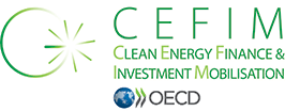Indonesia
Focus Group Discussion II: Implementation and technical design elements of ETS schemes
 |
 |
 |
||
Background
The OECD Clean Energy Finance and Investment Mobilisation Programme (CEFIM), along with the International Energy Agency, are assisting the Indonesian Government’s efforts to develop a domestic ETS through a series of technical Focus Group Discussions (FGDs). Building on international experience and OECD/IEA work, these FGDs will make deep-dives into a variety of critical aspects of the development of effective ETS schemes, relevant to the Indonesian context. These events will be taking place in Q4 2021-H1 2022.
Overview
As a key driver of energy-related emissions, decarbonising Indonesia’s power system will be determinant to achieve the country’s climate objectives. Indeed, under its recently updated nationally determined contribution (NDC), Indonesia aims to reduce its greenhouse gas (GHG) emissions by 29% (or 41% with international support) by 2030. In its recently submitted Long-Term Low-Emission Development Strategy, Indonesia has stated it will explore moving towards net-zero emissions 2060. As the country’s second largest greenhouse gas emitter, the energy (and power) sector is to make a major contribution towards these emission reduction targets.
Given the size of the challenge, Indonesia has been taking key steps to promote a clean energy transition. Most notably, Indonesia implemented a coal moratorium for new plants starting in 2022 and is planning for a massive increase of low-carbon power generation until 2060. In total, this transition away from coal could require around USD 1.165 trillion.
To support these measures, Indonesia is now looking to set a carbon price for the power and industry sectors in the form a domestic ETS, with a view to helping stimulate and drive investment towards low-carbon energy sources. As an initial step, Indonesia ran a voluntary emissions trading trial in the power sector from March to August 2021. The results of the pilot will be used to inform the mandatory ETS.
In light of these issues, this second FGD discussed how other ETS schemes have addressed some early challenges in the design and implementation phase such as determining the emissions cap, how the price will be determined and evolve, and the options of recycling the revenues raised from the scheme. During the discussion, country experts shared their experience designing and implementing such schemes as well as highlighted lessons learned that could also be useful in the Indonesian context. In this second FGD, the discussion also touched upon extending the ETS to the industry sector and the new challenges such an expansion might bring. An open dialogue, convening representatives from government institutions, development partners and other relevant stakeholders, will be organised towards the end of the event to inform and identify priority areas for ETS development in Indonesia.
- Watch the video recording of the event
Speakers
Opening remarks
- Bayu Nugroho, ST, MBA, Environmental Protection Co-ordinator, Directorate General of Electricity, MEMR
Panel Discussion
Moderator: Sara Moarif, Head of the Environment and Climate Change unit, IEA
- Kieran McNamara, Senior analyst, IEA: “ETS implementation: determining the cap, price setting, scope and allowance distribution”
- Dr Stefano De Clara, Head of Secretariat, International Carbon Action Partnership: “Revenue generation and use”
- Peter Vis, Senior Research Associate, European University Institute: “Experience from the EU ETS: context of the green recovery”
Panel Discussion
Moderator: Kieran McNamara, Senior analyst, IEA
- Marta Rosłaniec, Chief Expert in Strategy, Analysis and Auction Unit, KobiZE, Poland: “The impact of an ETS in a system dominated by coal-fired power”
- Danial Sturge, Practice Manager – Carbon Policy, Catapult, United Kingdom: “Development of the UK ETS”
Contact
For more information, please contact:
- Geraldine Ang, Team Leader, Clean Energy Finance and Investment Mobilisation, geraldine.ang@oecd.org
- Hakimul Batih, Indonesia Programme Local Representative, hakimul.batih@oecd.org

